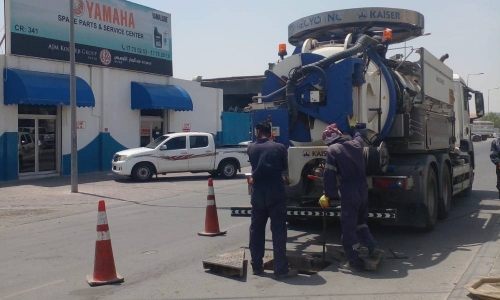Who are responsible for fatbergs blocking Bahrain's drainage networks?
TDT | Manama
The Daily Tribune – www.newsofbahrain.com
Cafeterias, restaurants, and commercial kitchens are accountable for the fatbergs blocking Bahrain's drainage networks, according to officials.
A fatberg is a rocky-like pile of waste material that forms in a sewage system when non-biodegradable materials, such as wet wipes, are flushed along with fat, oil, and grease deposits.
The Works Ministry tracked out the source of the grease and fats and found that some of these enterprises were flagrantly breaking the laws established by the Kingdom of Bahrain. As a result, the ministry took action and published 16 notifications in the first half of 2023.
The statement cautions that it is legally forbidden for restaurants in Bahrain to dump oily and fatty materials into the sewage system. The statement warns that food establishments across Bahrain are strictly prohibited from disposing of greasy and fatty substances into the public sewage system or discharging surface water without the necessary licenses.
As outlined in Law No. 33 of 2006, pumping highly acidic or highly alkaline substances, industrial detergents, cyanide compounds, sulphide compounds, tar, tar oils, oils, grease, and other materials exceeding the approved concentration levels into the sewerage system is strictly forbidden.
Additionally, these establishments are prohibited from releasing wastewater into surface water drainage facilities. The impact of such practises is widespread, causing inconvenience for citizens, residents, and municipal workers in areas with these establishments.
However, officials confirmed there has been a decrease in violations related to discharging prohibited substances into the drainage network, compared to 70 violations in the previous year. In 2021, the number of violators reached 87.
Out of the 16 violations this year, 11 were for discharging prohibited substances into the network; three were for non-compliance with security and safety requirements; one involved an unauthorised connection to the network; and the remaining cases were related to drainage issues.
To address these concerns effectively, the Works Ministry said it has deployed 18 judicial officers to inspect establishments, identify violations, and issue notices accordingly. Furthermore, the Works Ministry is actively developing a mechanism for issuing and renewing commercial records related to food and food manufacturing activities, with a focus on ensuring compliance with the installation of fat traps.
To address these issues, individuals are encouraged to report violations through the e-government portals at www.bahrain.bh and www.works.gov.bh. They can also reach out via the hotline at 8000-1810 or use the National system for suggestions and complaints, Tawasul.
Related Posts

